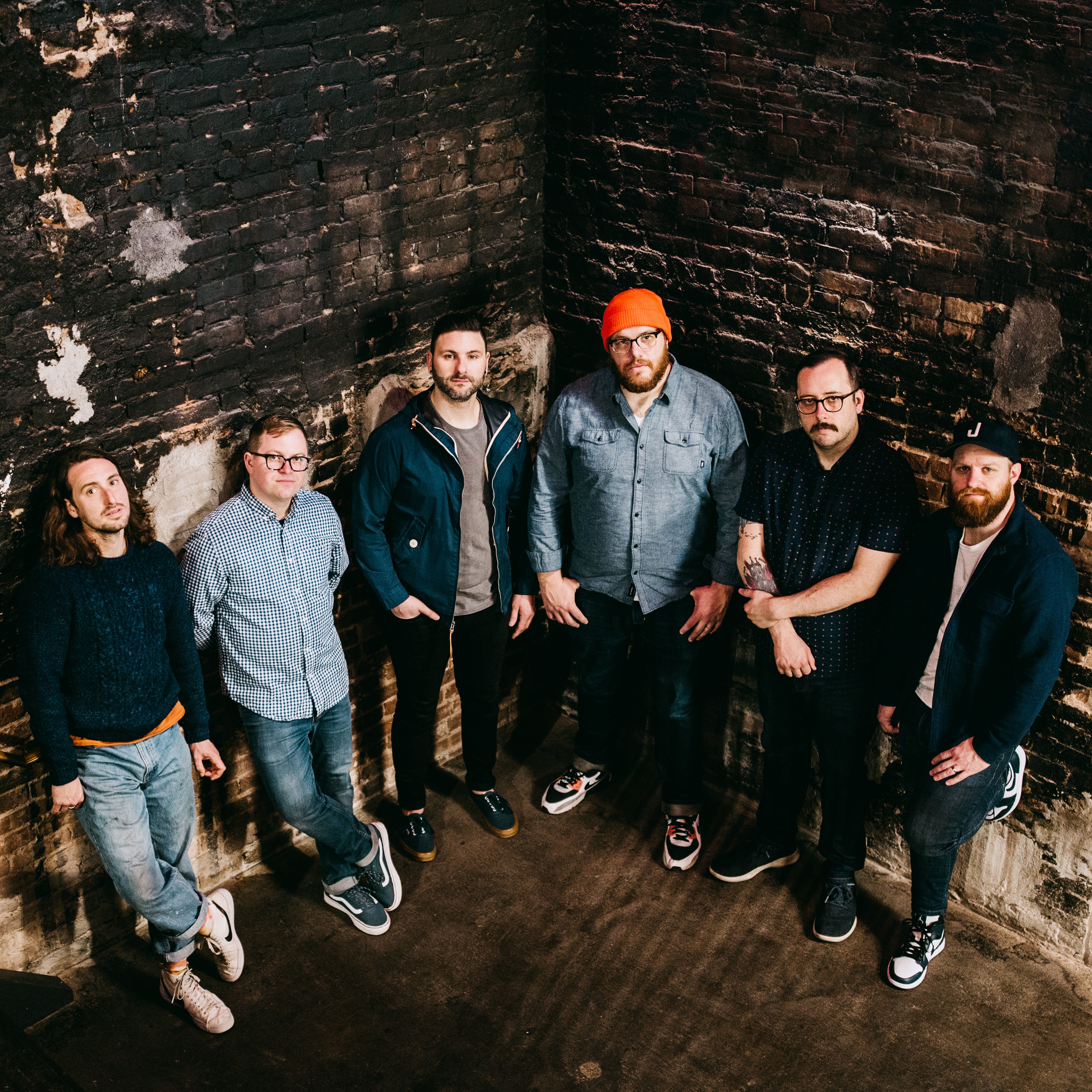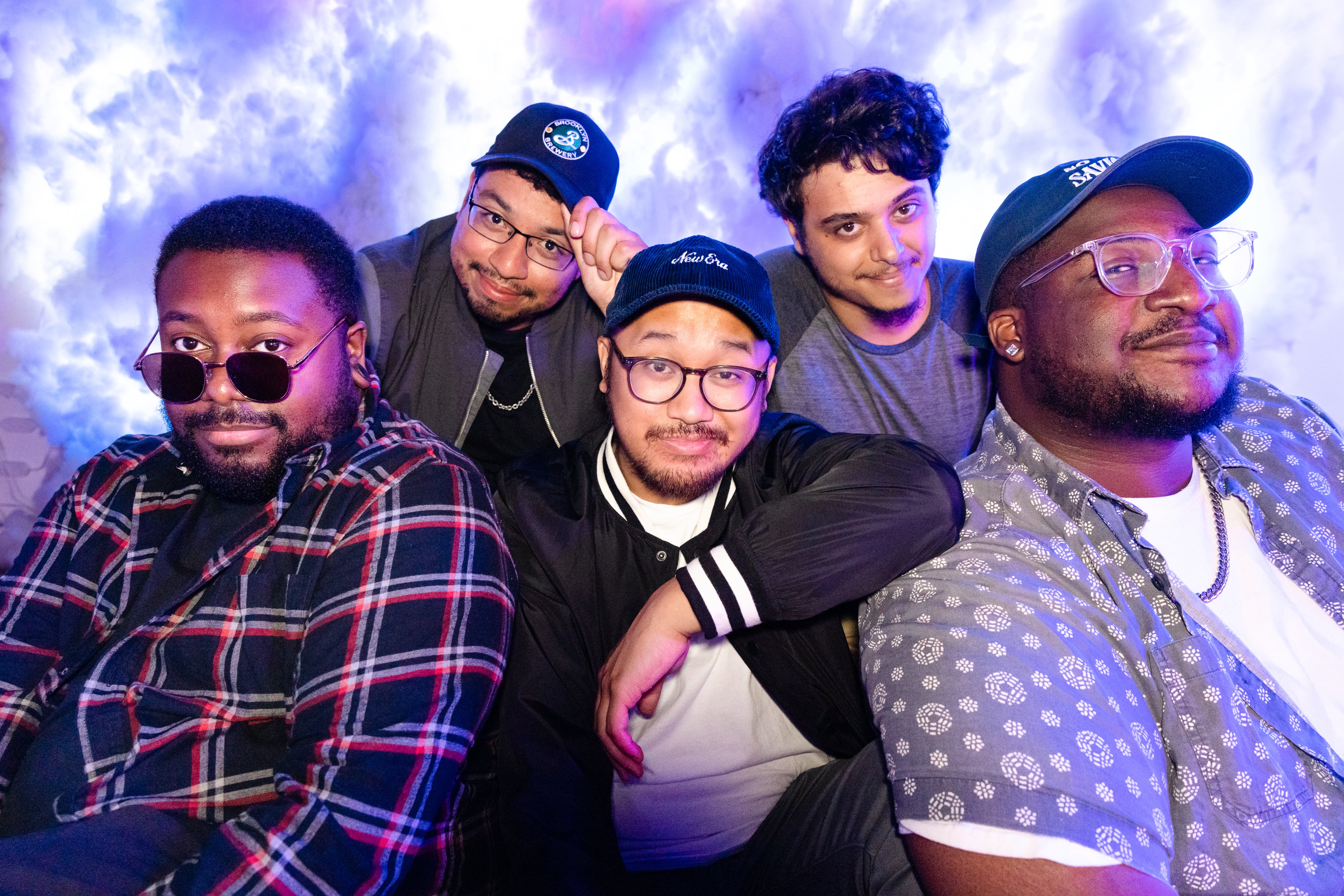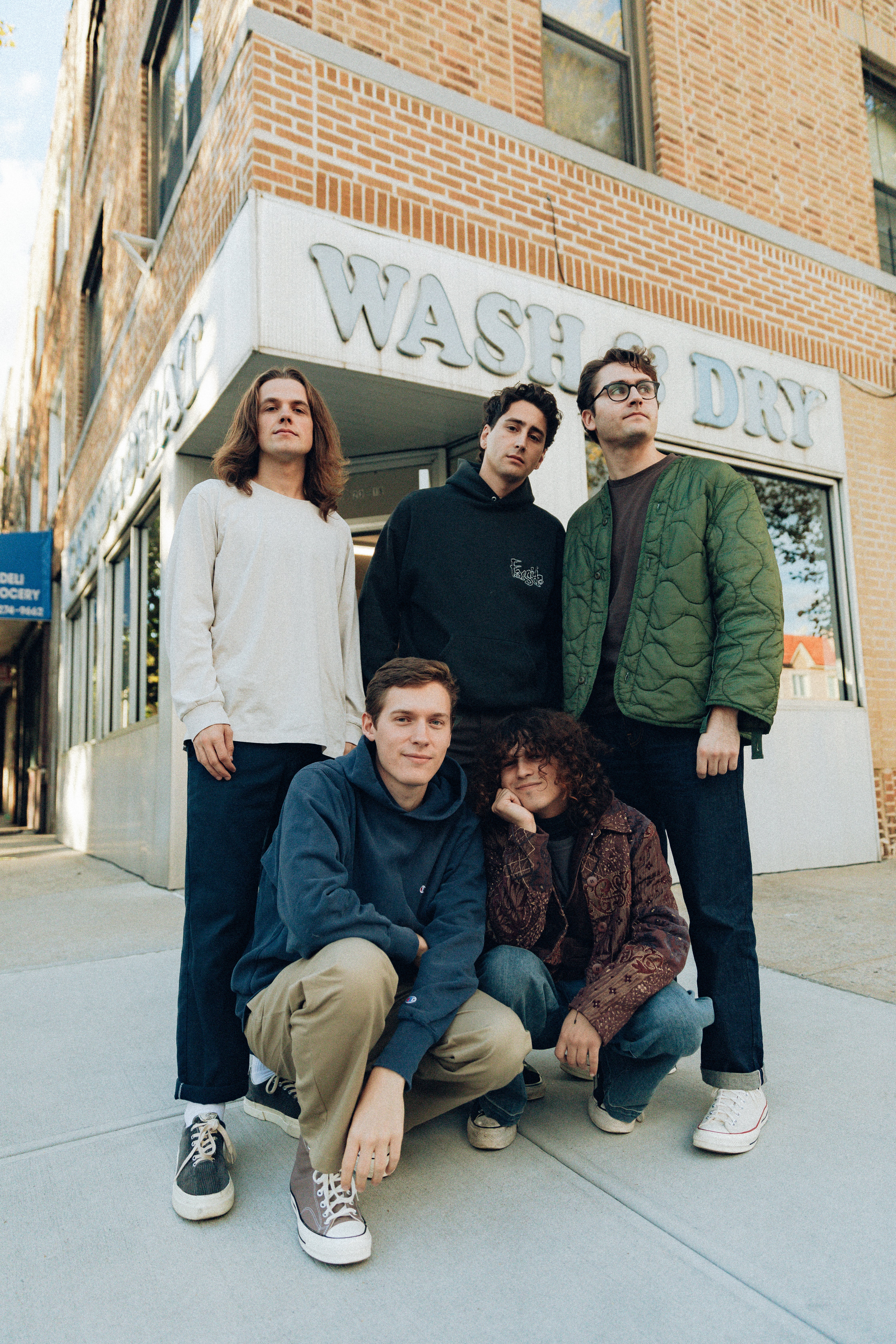The Wonder Years: The Greatest Generation 10th Anniversary Tour
Anxious, Sweet Pill, Action/Adventure

Event Info
Brooklyn Bowl Nashville
925 3rd Avenue North
Nashville, Tennessee 37201
This ticket is valid for standing room only, general admission. ADA accommodations are available day of show. All support acts are subject to change without notice. Any change in showtimes or other important information will be relayed to ticket-buyers via email. ALL SALES ARE FINAL Tickets purchased in person, subject to $3.00 processing charge (in addition to cc fee, if applicable). Sales Tax Included *Advertised times are for show times - check Brooklyn Bowl Nashville website for most up-to-date hours of operation*
Artist Info
The Wonder Years

For a number of years, this would have been an almost-blank page. Back in the mid-2010s, a few years afer The Wonder Years had first formed in Lansdale, PA, just north of Philadelphia, the band would be asked to provide a bio for events they were playing. All Dan Campbell would write was ‘The Wonder Years is a band’. That was it. They’d then receive the programs for whatever fesMval or event it was for and laugh. Most bands, the frontman remembers, would write a “full page thing about how their last record charted and ours would just be a blank page with those six words at the top.” A lot of Mme has passed since then, and a lot has changed, although also not that much, at the same Mme. If The Wonder Years – completed by guitarists MaT Brasch and Casey Cavaliere, drummer Mike Kennedy, bassist Josh MarMn and keyboardist/mulM-instrumentalist Nick Steinborn – could get away with a six-word bio, they probably would. As it happens, when it comes to The Hum Goes On Forever, context is important, which is why you’re reading these words. The most important reason is that this is the first record the band has made since Campbell became a father. And so, when he sings its very first words – ‘I don’t want to die’ – on its very first song, “Doors I Painted Shut”, they shimmer with a liTle extra poignancy and potency. Because as someone who has sung candidly about how despondent he’s felt at Mmes, thoughts of unexistence are no longer possible. It doesn’t mean they stop, but Campbell can no longer succumb to the abject malaise they induce. “You’ve got to pull it together,” he says, “because your kids are counMng on you. These things that feel hopeless – these massive cultural and societal, full-populace problems like climate change and school shooMngs, all the things that you’re afraid of for your children – well, they only get fixed if you fix them. ‘I don’t want to die – because I’ve got to protect you.’ It would be very easy to give in to the depression and just kind of lay there, but my kids are counMng on me, so I have to try to pull myself together and do the work. ” That, then, is the crux of this record: his survival is more important than it ever was before. As Campbell phrases it, “How do you take care of someone else that needs you when there are days that you barely want to exist?” Now that he’s a father, the answer is a lot simpler than it used to be. Quite simply, he doesn’t have a choice. Rather, he has to press on against the noise that’s been inside his brain for as long as he can remember. That’s what the ‘hum’ of this album’s Mtle is. Taken from a poem he wrote for Sister Ci:es, it is, he says, a representaMon of the gloom he tends to carry with him. “Even when it’s not constantly in my face,” he admits, “there’s always a low hum of sadness, a low rumbling of ennui. So The Hum Goes On Forever is the understanding that I’m always going to have it, it’s always going to be there, it’s always been there for literal generaMons of my family and it’s important that I accept that and live and work through it.” The Hum Goes On Forever, then, is the sound of The Wonder Years navigaMng those dark, cold waters, bringing that ever-present pulse in the back of Campbell’s mind to vivid life, while also pushing it as far back into his skull as it will go. It’s the kind of effect that’s only achievable through true collaboraMon and understanding, something that defines how the band has operated from its incepMon. The six-piece wrote the bulk of these songs in a farmhouse in the middle of Pennsylvania in the winter of 2021.This was before vaccines were widely available, so they all quaranMned for 14 days first. Then, a@er gecng vaccinated, they wrote together again in March, April and May, before tracking songs in June. IniMally, the idea was to just make an EP with Will Yip, but it instead became their seventh album, finished with Steve EveTs, a@er the band decided the songs would be under-served on an EP. The result is a record that captures the taught, fraught uncertainty of the period in which they were wriTen, but also travels back in Mme and memory to uncover and dwell on and inhabit le@over remnants of the past. It serves, too, as a revealing representaMon of how the six lives that consMtute The Wonder Years interact with each other. That happens both inside and outside of the band, obviously, but in terms of the former, they’ve all grown together immensely as musicians. It means the band knows when to be restrained and when to explode, filling in space and empMness as needed to create a record that mirrors, sonically, the heart-torn urgency at its core, the way these six individuals interact with each other, each an essenMal component of a greater whole - as well as the next evoluMon of a band that’s never stopped growing, never stopped striving, never stopped searching for the truth and the heart of this dumb thing we call life. It would be easy to talk about how specific songs do that, but that would also kind of defeat the point of this record. Because this is a complete journey and should be taken in as such. It begins in August and ends in June and traverses years and decades, as well as the constant cycle of sadness and healing within them. Except it never quite gets there. The hum is never totally shaken off. “Because the tagline for The Upsides was ‘I’m not sad anymore’,” Campbell explains, “I think people were like, ‘This is the guy who used to be depressed.’ But obviously that never goes away. It’s a constant, and you basically have to co-exist with your sadness. It won’t go away, but that doesn’t mean that people don’t rely on you and that you can stop. As we’ve conMnued to make records, that’s manifested itself in different ways, but I don’t think ever as clearly as it has on this record. This one is more clearly about me struggling and floundering and drowning at points. In fact, I think it’s maybe even the most revealing in a lot of ways. There’s things I’m singing about on this record that I wouldn’t have had the guts to confront in myself prior to it – like being this open about how low I had goTen, starMng in late 2019 and then tumbling into a pandemic, and just thinking and thinking and thinking….” There’s a lot of thinking on this record. A lot of thoughts. But the main one, the important one, is that very first line of the first song: I don’t want to die. It’s something he repeats and reiterates on final track “You’re The Reason I Don’t Want The World To End”, which addresses the change in Campbell’s purpose since becoming a dad. That’s obvious enough from the Mtle alone, but with the final line – inspired by gardening with his first son during the pandemic – the message becomes truly clear: ‘Put the work in, plant a garden, try to stay afloat.’ It’s a reminder to himself, but it’s also for anyone who listens, anyone who needs it, everyone who’s grown up with the band and has sought, and conMnues to seek, refuge in their songs. Because, yes, The Wonder Years is a band. But it’s also much, much more than that.
Sweet Pill

Philadelphia’s Sweet Pill write eruptive emo songs that embrace the edges of pop and hardcore. The kind of band whose members are fully immersed in their local scene—through a handful of notable side projects and the show-promoting Philly staple 4333 Collective—the quintet’s sound takes wide-spectrum influence from its environment. The result is an amalgam of complex song structures and flourishes of technical acumen, wholly unconcerned with genre, yet evoking the specific styles of touchstones such as Paramore and Circa Survive.
Action/Adventure

Action/Adventure shouldn’t be here. At least, that’s what the Chicago-based five-piece seem to think. They’re wrong – very wrong – but that’s the overriding theme of their debut album. That’s partly why they named it Imposter Syndrome – because when the band signed to Pure Noise Records, they couldn’t quite believe it. Even after they released their seven-track EP Pulling Focus in 2021, and even after that EP’s lead track “Barricades” went viral on TikTok, it didn’t feel real. After all, this is a label that’s put out some of their favorite albums by some of their favorite bands, and now they were a part of it. That sense of confused bewilderment was compounded by the timing of it all.
“For us,” says lead vocalist Blake Evaristo, “having a debut on Pure Noise is insane. Especially because, when “Barricades” blew up for us and we got all that TikTok clout, it happened during the pandemic, so we didn’t even play a show till nearly a year later. And I feel like in that time, we were having imposter syndrome, hence the title. It didn’t feel real.”
“And honestly,” adds vocalist/guitarist Brompton Jackson, “it still doesn’t even feel real. We’ve just been asking questions like is this real? Do we belong here? Is this even happening?”
Much as the band – completed by drummer Adrian Brown, bassist Manny Avila and guitarist Oren Trace – might feel that way, the facts are simple: it is real, they do belong here and it is definitely happening. But their imposter syndrome runs deeper than that, namely because they’re an entirely BIPOC band in the pop-punk scene, which automatically adds an extra layer of depth and uneasiness to everything. It’s what the TikTok video for “Barricades” was all about, and it’s an inherent part of their identity. That video was never meant to blow up, nor was it meant to be overtly political. It simply captured how they felt about who they were and was uploaded to TikTok by Jackson one day on a whim.
“It was the first video we put on TikTok,” says Evaristo. “Brompton made the account that same day, and to see it connect with people has been amazing. But we’re also here now to show that we’re more than that one song! We’ve had hate comments saying that we’re race baiting, which is so frustrating.”
“But we’re 100% not,” adds Jackson. “Me, Oren and Adrian have been playing music together for the past 16 or 17 years. We went to high school together and grew up playing music. Manny was originally friends with Oren’s wife, and we found Blake on Craigslist. It was kismet.”
Still, Action/Adventure are acutely aware their existence is nevertheless important in terms of visibility. They’re just also keen to stress that their initial intentions were all music-focused, and that it’s chance, not design, that they’re all BIPOC.
“Those two parts have to co-exist on completely even playing fields,” explains Jackson. “One can’t really outshine the other. Growing up in the scene, I almost felt like a pariah – I could count the amount of other black people going to shows on one hand. One of them is Adrian! You’d always see the same four or five other black people at shows, so you get to know each other. So it’s important to not lose sight of that, but I also don’t want us to be a token band. We’re just a band. We’re a group of people playing music that we like to listen to and that we like to write – and we just all happen to be people of color. It was an accident, it wasn’t planned.”
“We just wanted to play music,” adds Brown. “We all played music individually and ultimately it just seemed easy to play that music together. And while you don’t see a lot of people of color doing this kind of music, not many people I knew in high school liked metalcore and pop-punk, so when you find those people you’re naturally drawn to together. I just wanted to create the feeling that I got when I saw bands play.”
If that was the band’s intention, they’ve achieved it. Imposter Syndrome begins with the emphatic rush of the title track. Its blitz of flurried, angular guitars that are simultaneously aggressive and poppy, before doubling down on the main concern that plagues the record: ‘We’re the imposters’. The irony is that that song, and this record, proves otherwise. Elsewhere, “Save Yourself” is a powerfully urgent call to arms that brutalizes (in a positive way) the typical pop-punk template, while “Losing Streak” lays bare their insecurities, but pits their defiance and determination against it.
“In good times,” says Brown, “I can listen to it and be like ‘Hell yeah, I survived.’ And in bad times I can hear it and be like ‘Don’t forget to keep pushing.’ It hits me and my spirit 110%.”
“There’s a lyric in that song that goes ‘No matter what the cost is we’re still chasing losses’,” adds Avila, “and that’s so true. Because no matter what it does cost, we’re still chasing it, still going, still pushing.”
One of the other hesitations that manifests itself in this record is the fact the members of Action/Adventure are older than most pop-punk bands who release a debut album. If it’s not quite a chip on their shoulder, it’s certainly something that’s nesting in the back of their minds. But it also lends their music – as youthful and full of vitality as it is – an extra level of gravitas. It makes it matter so much more.
“We joke that it’s pop-punk for adults,” smiles Evaristo. “But our ages do add to our imposter syndrome. Age and time has just always been a struggle, and you can hear it in the lyrics too. A lot of it talks about the frustrations of that, because pop-punk is always seen as young persons’ genre and we’re just getting started. We are a little older, but we want to show that it’s never too late.”
“Over the years,” adds Jackson, “I feel the genre has really become like a meme. A lot of people don’t take it seriously – when people ask what kind of music we play and I say I’m in a pop-punk band, I’ve gotten responses like ‘I used to listen to pop-punk when I was in high school.’ It’s real tongue-in-cheek. But having it feel very genuine and being able to articulate that these are our actual feelings and emotions and thoughts is very important to all of us.”
One listen to this record, and that’s clear. It’s emotive and erudite, sophisticated and serious, fun but also full of the trials and tribulations, insecurities and uncertainties that make us all human. All that is channeled into these 10 impassioned and precise, vigorous and spirited songs. The fact that it hits so incisively and profoundly demonstrates why – even if they use the term with tongues firmly in cheek – pop-punk for adults is the perfect description. It’s precisely because they’re adults and have known each other for a very long time, that it’s able to be that.
“I’ve existed with these people for so long that they’re integral parts of my life,” admits Jackson. “They’re not my bandmates, they’re my family. We’ve all been in many different projects, and this is by far the easiest project I’ve ever been involved with. It’s not hard at all. I mean, it’s hard for the reasons that being a band is hard, but being in a band with these four other people is completely second nature at this point. That part of it isn’t work at all, and I’m eternally grateful for that.”
“Even if half of the lyrics are whining about being in a band,” chuckles Evaristo. “But I hope people listen to it and see through our own eyes that being in a band is fun, but that there’s some real shit going on, too. This might be our first album, but we’ve all been through the wringer, and I hope people hear that we have real stuff that we’re dealing with – whether that’s being in a band, being a person of color in the scene or chasing a dream that seems so hard and unattainable. I really hope people can feel what we’re feeling.”









